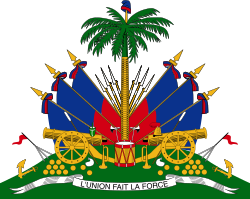 |
|---|
Partial Senate elections were held in Haiti on 18 January 1993 to elect one-third of the 27-member Senate. [1] The elections were held alongside by-elections for one seat in the Senate and three in the Chamber of Deputies. [2]
Held under the rule of Raoul Cédras (who had overthrown the democratically elected government in a 1991 coup) and overseen by Marc Bazin, [3] the elections were declared illegitimate by the Permanent Council of the Organization of American States. [1] The members elected were supportive of the coup. [3] Voter turnout was reported to be low. Supporters of exiled president Jean-Bertrand Aristide denounced the elections as illegal. The United States and the Organization of American States opposed the elections because they would delay the negotiations to restore Aristide's government. [4]